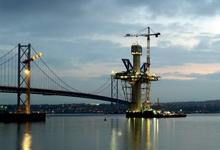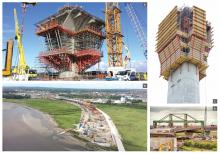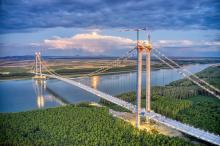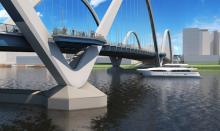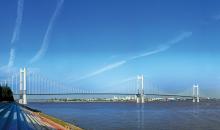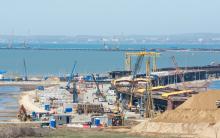Construction work is underway on India’s Bogibeel Bridge, which will span the Brahmaputra River. When complete the bridge is expected to come with a price tag of US$746.8 million. The new bridge will provide both road and rail links over the Brahmaputra River and is expected to open to traffic in March 2018. The novel design features an upper deck with three traffic lanes for road vehicles as well as a lower deck carrying twin rail lines. Measuring 4.9km long, the bridge will be the longest in India carryin
Construction work is underway on India’s Bogibeel Bridge, which will span the Brahmaputra River. When complete the bridge is expected to come with a price tag of US$746.8 million. The new bridge will provide both road and rail links over the Brahmaputra River and is expected to open to traffic in March 2018. The novel design features an upper deck with three traffic lanes for road vehicles as well as a lower deck carrying twin rail lines. Measuring 4.9km long, the bridge will be the longest in India carrying both rail and road connections. Featuring an all-welded steel construction, the structure is said to be lighter than earlier designs made from girders that are bolted together.
A novel feature of the project is that the width of the Brahmaputra River had to be narrowed by around 5km on either side using bunds to allow the construction of the bridge. These bunds have been carefully designed so as to lower the risk of erosion of the supports for the bridge structure. The design of the bunds also ensures that the river does not change its course. During the rainy season, water flow rates can be high, which could otherwise result in erosion or the river changing its course.
A novel feature of the project is that the width of the Brahmaputra River had to be narrowed by around 5km on either side using bunds to allow the construction of the bridge. These bunds have been carefully designed so as to lower the risk of erosion of the supports for the bridge structure. The design of the bunds also ensures that the river does not change its course. During the rainy season, water flow rates can be high, which could otherwise result in erosion or the river changing its course.

